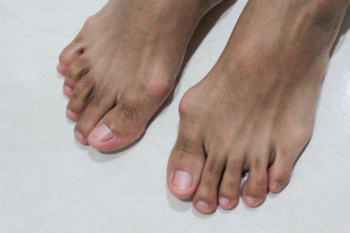
A bunion is a bony bump that forms on the joint at the base of the big toe, typically due to misalignment of some of the bones in the front of the foot. This misalignment can force the tip of the big toe toward the smaller toes, causing the base of the joint to protrude. Common causes of bunions include wearing tight or narrow footwear, hereditary foot shapes, and medical conditions like arthritis. Symptoms include swelling, redness, and persistent pain at the big toe joint. A podiatrist can assess the severity of the bunion and recommend appropriate treatment options. Non-surgical choices include wearing shoes with a wider toe box, using protective pads, or applying orthotic devices to redistribute pressure. If non-surgical measures are ineffective, surgery may be considered to realign the bones or remove inflamed tissue. If you have developed a bunion that is causing pain, it is suggested that you schedule an appointment with a podiatrist for an exam and treatment.
If you are suffering from bunion pain, contact Thomas Bobrowski, DPM of InStride Crystal Coast Podiatry. Our doctor can provide the care you need to keep you pain-free and on your feet.
What Is a Bunion?
Bunions are painful bony bumps that usually develop on the inside of the foot at the joint of the big toe. As the deformity increases over time, it may become painful to walk and wear shoes. Women are more likely to exacerbate existing bunions since they often wear tight, narrow shoes that shift their toes together. Bunion pain can be relieved by wearing wider shoes with enough room for the toes.
Causes
- Genetics – some people inherit feet that are more prone to bunion development
- Inflammatory Conditions - rheumatoid arthritis and polio may cause bunion development
Symptoms
- Redness and inflammation
- Pain and tenderness
- Callus or corns on the bump
- Restricted motion in the big toe
In order to diagnose your bunion, your podiatrist may ask about your medical history, symptoms, and general health. Your doctor might also order an x-ray to take a closer look at your feet. Nonsurgical treatment options include orthotics, padding, icing, changes in footwear, and medication. If nonsurgical treatments don’t alleviate your bunion pain, surgery may be necessary.
If you have any questions, please feel free to contact our office located in New Bern, NC . We offer the newest diagnostic and treatment technologies for all your foot care needs.
